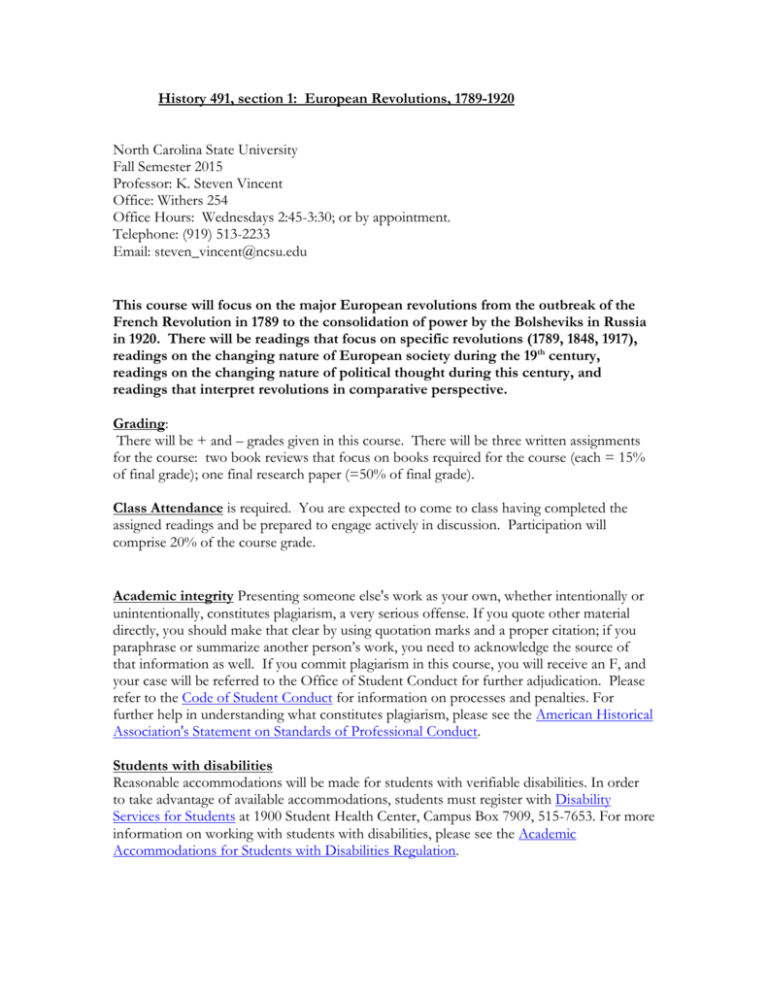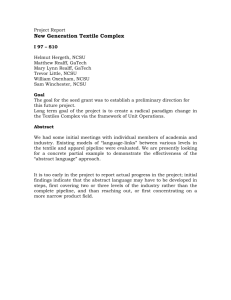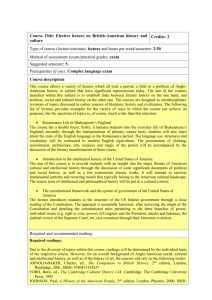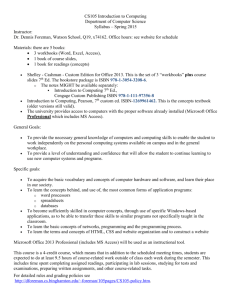
History 491, section 1: European Revolutions, 1789-1920
North Carolina State University
Fall Semester 2015
Professor: K. Steven Vincent
Office: Withers 254
Office Hours: Wednesdays 2:45-3:30; or by appointment.
Telephone: (919) 513-2233
Email: steven_vincent@ncsu.edu
This course will focus on the major European revolutions from the outbreak of the
French Revolution in 1789 to the consolidation of power by the Bolsheviks in Russia
in 1920. There will be readings that focus on specific revolutions (1789, 1848, 1917),
readings on the changing nature of European society during the 19th century,
readings on the changing nature of political thought during this century, and
readings that interpret revolutions in comparative perspective.
Grading:
There will be + and – grades given in this course. There will be three written assignments
for the course: two book reviews that focus on books required for the course (each = 15%
of final grade); one final research paper (=50% of final grade).
Class Attendance is required. You are expected to come to class having completed the
assigned readings and be prepared to engage actively in discussion. Participation will
comprise 20% of the course grade.
Academic integrity Presenting someone else's work as your own, whether intentionally or
unintentionally, constitutes plagiarism, a very serious offense. If you quote other material
directly, you should make that clear by using quotation marks and a proper citation; if you
paraphrase or summarize another person’s work, you need to acknowledge the source of
that information as well. If you commit plagiarism in this course, you will receive an F, and
your case will be referred to the Office of Student Conduct for further adjudication. Please
refer to the Code of Student Conduct for information on processes and penalties. For
further help in understanding what constitutes plagiarism, please see the American Historical
Association's Statement on Standards of Professional Conduct.
Students with disabilities
Reasonable accommodations will be made for students with verifiable disabilities. In order
to take advantage of available accommodations, students must register with Disability
Services for Students at 1900 Student Health Center, Campus Box 7909, 515-7653. For more
information on working with students with disabilities, please see the Academic
Accommodations for Students with Disabilities Regulation.
Electronic devices
The use of electronic telecommunications devices (cell phones, Blackberries, iPhones, etc.)
in class is strictly prohibited. All personal communication devices must be turned off at all
times. Laptop computers will not be permitted in class.
Class evaluations
Online class evaluations will be available for students to complete during the last 2 weeks of
the semester and become unavailable before finals begin. Students will receive an email
message directing them to a website where they can login using their Unity ID and complete
evaluations. All evaluations are confidential; instructors will not know how any one student
responded to any question, and students will not know the ratings for any instructors.
Evaluation website: https://classeval.ncsu.edu/
Student help desk: classeval@ncsu.edu
Career Services for Humanities and Social Sciences Majors
Explore career options related to your major, make decisions about your major or minor,
build resumes and cover letters, prepare for interviews, develop internship/ job search
strategies, maximize career fairs, and more. Use ePACK to make an appointment with your
career contact-- Woody Catoe -- at ncsu.edu/epack. Career Development
Center: careers.ncsu.edu.
Critical thinking assessment (voluntary participation for graduating seniors):
Graduating seniors are asked to participate in a critical thinking assessment during the weeks
of [DATES TBD]. Performance on this assessment will not impact your grade in class. It
will take approximately one hour to take the assessment and you will not need to do
anything to prepare. This is an important element of the assessment of the NC State
University QEP and General Education Competencies. You are encouraged to do your best
work! This information will help us determine the impact of our programs and guide future
decisions regarding the education of our students. Additionally, at some point before you
take the in-person assessment, you must go to this link [INSERT LINK] and take a brief
self-assessment. This will take less than 10 minutes and is a necessary component of the
overall assessment that must be completed.
You will be receiving an email from Dr. Stephany Dunstan, Assistant Director of the Office
of Assessment, with options for dates and times as well as a sign up form. Please pick a
date/time and sign up. If you have an ADA letter and need special accommodations or if
you are having trouble finding a time you can attend, please contact Stephany Dunstan
(sbdunsta@ncsu.edu)
Common Readings:
Jeremy D. Popkin, A Short History of the French Revolution (Upper Saddle River, NJ: Pearson
Prentice Hall, 1995) ISBN 9780205693573.
Paul R. Hanson, Contesting the French Revolution (West Sussex, U.K.: Wiley-Blackwell, 2009)
ISBN 9781405160841.
Jonathan Sperber, The European Revolutions, 1848-1851 (Cambridge: Cambridge University
Press, 1994) ISBN 9780521547796.
Alexis de Tocqueville, Recollections (selection), and Karl Marx, The Eighteenth Brumaire of LouisNapoleon Bonaparte (selection) – both readings handed out in class.
Sheila Fitzpatrick, The Russian Revolution (New York: Oxford University Press, 1982/1994)
ISBN 9780199237678.
Crane Brinton, The Anatomy of Revolution [1938] (reprint: New York: Vintage, 1965).
Theda Skocpol, States and Social Revolutions: A Comparative Analysis of French, Russia, and China
(New York: Cambridge University Press, 1979) ISBN 9780521294997.
Martin Malia, History’s Locomotives: Revolutions and the Making of the Modern World (New Haven:
Yale University Press, 2006) ISBN 9780300126907.
Schedule for Discussions:
August 24: Introductions
August 31: Popkin, pp. 1-70; Hanson, pp. 1-86.
No class September 7: Labor Day Holiday.
September 14: Popkin, pp. 71-145; Hanson, pp. 87-197.
September 21: Sperber, pp. 1-104; Tocqueville and Marx (handout).
September 28: Sperber, pp. 105-259. Book Review # 1
October 5: Fitzpatrick.
October 12: Brinton.
October 19: Skocpol.
October 26: Malia. Book Review # 2
November 2: Meetings
November 9: Bibliography and Outlines Due
November 16: Meetings
November 23: Presentations
November 30: Final Papers Due









